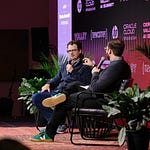Jane Poynter spent two years and 20 minutes in a biosphere back in the early 1990s. (There’s a documentary about it.)
Later, Poynter set her sights on a mission to Mars. Wired wrote in 2014, “Meet the Couple Who Could Be the First Humans to Travel to Mars.” The story was about Poynter and her husband, Taber MacCallum.
These days, the duo is working together on building a hydrogen balloon that will take tourists to space for $125,000. Poytner came on the podcast to talk about her startup, Space Perspective. We also discussed SpaceX, Elon Musk, Virgin Galactic, and the state of the adventure tourism industry in light of the deep sea deaths on a OceanGate submersible headed to the Titanic.
On the show, Poynter said that Space Perspective, which has about 130 employees, has raised almost $70 million. Prime Movers Lab and LightShed Ventures are major investors, Poynter said. She told us that she hopes to commercial operations “around the end of 2024.”
Venture capitalist, chief of staff newsletter author, and AI event host Ali Rohde joined me as a guest co-host for the episode. (She’s a friend of the show and I’m exploring different podcast episode formats. I always welcome your feedback and advice. In that spirit, I’ll mention that I’m still looking for a podcast producer.)
Think of the episode as part two in my exploration of space startups. Last week, I talked with Delian Asparouhov, the co-founder of Varda Space Industries.
This week, we interrogate space tourism. Give it a listen.
Highlighted Excerpts
The transcript has been edited for clarity.
What if anything did you take away from the OceanGate situation?
Jane: What’s fascinating is we got almost no customer questions or refund requests due to the OceanGate accident. It’s incredibly different from what we do. Also, in the 60+ years of deep ocean submersible operations there had never been a fatal accident until that incident. You have to ask why. I don’t want to focus on OceanGate specifically, but the big takeaway for us was that we embrace regulatory oversight. We want the FAA and Coast Guard to work with us since we also operate at sea. We go so far beyond any standards they would set that it’s good for us and the industry to have that accountability and transparency. That was the main takeaway: We welcome reasonable regulations and oversight.
Space tourism more akin to safaris than Virgin Galactic
Jane: It’s interesting that you talk about Blue Origin and Virgin not being competition because the experience is so differentiated from what we offer. Our experience is more akin to incredible safaris, trips to Antarctica, and other wonder travel that deeply transforms people. That’s why we priced our tickets at $125,000. It’s in line with those kinds of life-changing experiences. When Antarctica tourism opened up, there was a huge demand from people willing to pay high prices for a once-in-a-lifetime trip. We’re seeing incredible excitement and demand from customers wanting to go to space with us. We have an event coming up soon with over 100 of our explorers gathering here, and they all want to connect with each other too. We’re building a real community around spaceflight and this experience. It’s going to be such an extraordinary, bonding experience for people. I truly believe it will bring people together in a deep way.
You mentioned Blue Origin, Virgin, and SpaceX — obviously some of the first names people think of when space is mentioned like Elon Musk and Jeff Bezos. They are controversial figures, likely quite different from our target customer base. But I'm curious. What do you think about them? Are you grateful for how they've helped popularize and mainstream space travel?
Jane: Taber and I worked with Elon before he started SpaceX, so we have an interesting perspective. In the early days of SpaceX, space tourism was considered a joke and the idea that commercial companies could enable space travel or moon/Mars missions was insane. It was assumed that only governments could do that. Elon deserves a lot of credit; Gwynne Shotwell too. She's done an incredible job revolutionizing the space industry by lowering costs, improving efficiency and effectiveness, and showing us what's possible. SpaceX paved the way for the over 100 small rocket companies operating now, which never would have happened without that trailblazing. So while there are likely narrative or cultural elements we wouldn't fully align with, overall we are absolutely grateful for the pivotal role SpaceX played in advancing commercial space and making it seem achievable.
What excites you about exploring space?
Jane: When I think about space exploration, I don’t view it as leaving Earth never to return. I actually quite like this planet! To me, space exploration is more of an extension of the perspective-broadening we do now. When people look down on Planet Earth from space, it’s a mind-blowing experience. Now imagine yourself standing on the moon or Mars and seeing Earth. It’s that exponentially more impactful. It will give people a wildly different perspective on what it means for all of us to live together. We should think of ourselves as one human family living on Spaceship Earth. As we venture farther out, it will become increasingly clear that we’re holding up a mirror to humanity, seeing ourselves somewhere other than Earth for the first time. It’s a wild concept. So that’s how I view space, not as leaving the planet but expanding our perspective to appreciate that we’re all in this together.
How do you prevent accidents in the air?
Jane: A common question we get is what happens if something goes wrong with the balloon? The balloon technology is incredibly well understood with a long legacy. Hundreds have been flown in the last 20 years without a single in-flight incident. However, we obviously need backup systems. We have a series of parachutes, similar to those used on SpaceX’s Dragon capsules or other space vehicles. They are robust, proven parachutes. We have four total, with only two needed for a safe landing. The parachutes are only used in an emergency scenario because normally the ship ascends under the balloon and descends back onto the balloon, keeping the flight system consistent. This is a very safe approach, never transitioning between flight systems. We’ve focused on simplicity everywhere possible because simpler systems tend to be safer overall.














Share this post